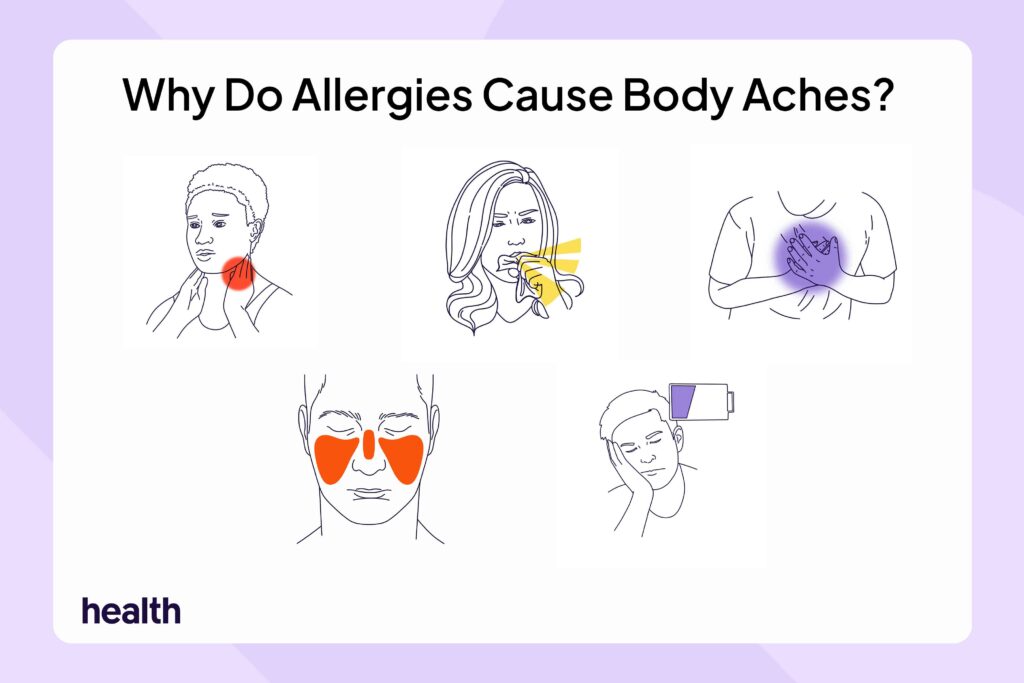:max_bytes(150000):strip_icc():format(jpeg)/Health-Allergies-Symptoms-text-0192b062c4e54cab8a442fcd5071e997.jpg)
Allergies occur when your immune system overreacts to harmless substances, like pollen or pet dander.
Allergies to substances like pollen commonly cause sneezing, a runny nose, and itchy eyes. Chronic symptoms of sneezing, nasal congestion, and coughing can sometimes lead to aches, particularly in related body areas.
Body aches are not a direct result of an allergic reaction, but allergy symptoms like inflammation, coughing, and sinus congestion may lead to body aches.
It may take hours for these accompanying aches to develop after you’ve come into contact with an allergen. Before you experience aches from allergies, you will experience other symptoms like sneezing, coughing, and nasal congestion.
Inflammation
During an allergic reaction, your immune system creates an inflammatory response in your body. This inflammation (swelling) is sometimes limited to your sinuses or skin.
If you have an inflammatory health condition that causes muscle or joint pain, such as arthritis or fibromyalgia, increased inflammation from allergies may trigger or worsen that pain.
Coughing and Sneezing
Frequent coughing and sneezing, which often occur with seasonal allergies, can strain your muscles. This strain can lead to muscle soreness and aches, which you may feel in your chest and back.
Costochondritis
Inflammation from allergies or strain from coughing sometimes affects the cartilage connecting your ribs and breastbone. This condition, called costochondritis, causes chest pain that may move to your stomach or back and may be especially painful when coughing or taking a deep breath.
Sinus Pain
Sinus congestion from allergies can cause headaches as well as pressure and pain in your face. This pain can sometimes radiate (spread) to other parts of your body due to shared nerve pathways, which may result in general achiness in your face.
Fatigue
Living with allergies can make you feel tired and achy. Coughing, sneezing, and sinus pain can wear you down, and you may have trouble sleeping. Some allergy medications may even make you feel groggy or feel like you aren’t sleeping well. Eventually, you may develop fatigue.
With fatigue, you feel an exhaustion that rest or sleep doesn’t help, with symptoms like muscle soreness and weakness, headaches, or joint pain.
Anaphylaxis
Allergens sometimes cause an extreme reaction called anaphylaxis, which affects multiple systems in the body. This life-threatening reaction happens quickly and requires emergency care. Allergens that most commonly cause anaphylaxis are foods, medications, and insect bites or stings.
Symptoms of anaphylaxis can vary, but they may include aches that result from:
- Abdominal cramping
- Chest tightness
- Hives
- Swelling of your face or tongue
- Wheezing or trouble breathing
- Trouble swallowing
- Low blood pressure, dizziness, or passing out
- Nausea, vomiting, or diarrhea
Treating your allergies may help reduce your body aches. You can also take steps to help manage the ache more directly.
For Allergies
Treating your allergies can help prevent or treat body aches that come with them. The best way to treat allergies is to avoid your allergic triggers.
Specific treatments for allergies depend on where your symptoms occur, their severity, and how often they happen. Prescription and over-the-counter (OTC) treatment options include:
- Antihistamines to reduce symptoms caused by histamine
- Intranasal corticosteroids (often called steroids) to reduce symptoms caused by nasal swelling
- Leukotriene inhibitors to block your immune system’s reaction to allergens
- Immunotherapy to make your immune system less sensitive to allergens
For Body Aches
You can also help manage body aches at home with these strategies:
- Take OTC nonsteroidal anti-inflammatory drugs (NSAIDs), such as Advil (ibuprofen) or Aleve (naproxen), to help reduce swelling
- Apply a cold compress to help relieve joint pain
- Apply a warm compress or take a warm bath to soothe sore muscles
- Gently stretch the muscles
- Massage the sore area
Preventing allergies is the best way to avoid allergy-related body aches. Here are some tips:
- Minimize your exposure to allergens: Determine your allergy triggers, and avoid them whenever possible. This might involve staying indoors when pollen counts are high, keeping away from pets, or avoiding foods you are allergic to.
- Take allergy medications: Consistently take any medications your healthcare provider has recommended for your allergies.
- Pay attention to weather and pollen forecasts: Pollens can wreak havoc on warm, windy days, while mold thrives in humid environments. Plan your outdoor activities for times when allergen levels are low.
- Keep windows closed: During high pollen seasons, keep your car and home windows closed.
- Clean your home regularly: Frequent cleaning can help reduce dust mites, pet dander, mold, and other indoor allergens.
- Get a good night’s sleep: Lack of sleep can increase fatigue and the achiness that comes with it.
- Drink plenty of fluids: Dehydration can make muscle aches worse.
Mild body aches with allergies are not usually anything to worry about. They typically pass when your body stops reacting to the allergen. However, you should call your healthcare provider right away if you have:
- Severe pain or pain that lasts more than a few days
- Signs of anaphylaxis, like trouble breathing or swallowing
- Signs of infection, like redness or extreme swelling
- A tick bite or rash
- A high fever
Allergies can lead to body aches through inflammation, sinus pressure, fatigue, and muscle strain from coughing and sneezing.
Avoiding your allergy triggers can help prevent allergy-related body aches, and managing your allergies can help relieve them.
Contact a healthcare provider if your body aches are severe or occur alongside other concerning symptoms. If you feel generalized body aches without itchy, watery eyes, runny nose, sneezing, or other common allergy symptoms, your generalized aches are likely due to another cause.



